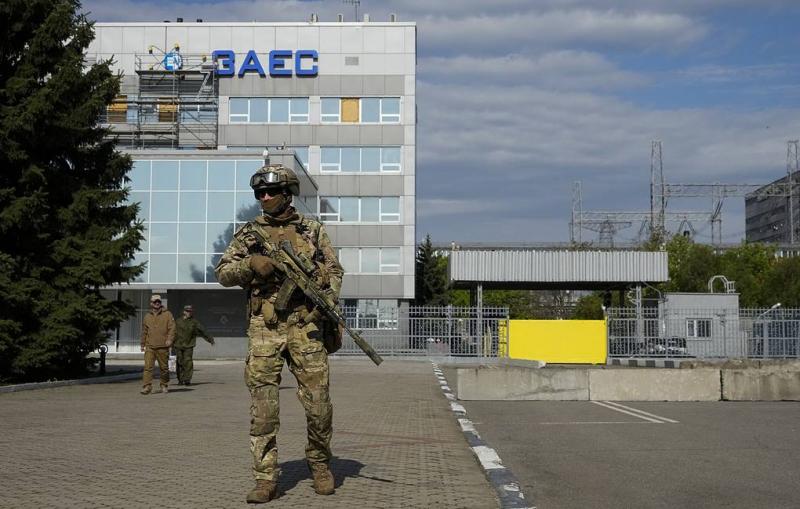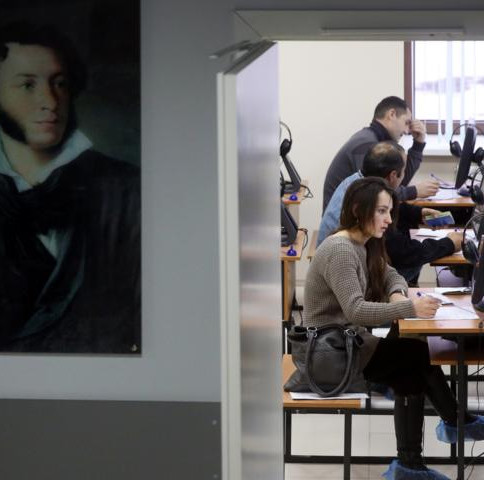
© AP Photo/TASS
Top stories from the Russian press on Friday, August 19th, prepared by TASS
Izvestia: UN, Russia differ on Zaporozhye plant’s demilitarization
The crisis around the Zaporozhye nuclear power plant remains extremely complicated, and any provocation may lead to a disaster, warned UN Secretary-General Antonio Guterres and Turkish President Recep Tayyip Erdogan, who visited Lvov on Thursday. The United Nations is calling for demilitarization of the nuclear facility which, Russia argues, would make it even more vulnerable under the current circumstances.
The UN chief stressed that the Zaporozhye plant should not be used in any military operation. Instead, he said, an urgent deal is needed to restore civilian infrastructure at the nuclear power plant and guarantee the security around it. In his turn, the Turkish leader said the world did not need "another Chernobyl." According to Guterres, inspectors from the International Atomic Energy Agency could visit the nuclear plant from Kiev, given there is agreement between Russia and Ukraine.
Sergey Ordzhonikidze, former director-general of the UN office at Geneva, said demilitarization would also mean a halt to the Russian special military operation, and Moscow would not agree to that. "The UN Secretary-General is acting on America’s command, while Erdogan is seeking to promote his own compromise proposals that he could impose on the world," he told Izvestia. Ordzhonikidze viewed the trilateral meeting as a futile affair. Any further shelling of the Zaporozhye NPP by Ukraine risks a nuclear disaster, he warned.
Another key issue on yesterday’s agenda was grain exports under agreements reached in Istanbul on July 22. Political analyst Kerim Has said finding a solution to the grain issue was crucial for Turkey’s president, with Russia and Ukraine accounting for over 85% of Turkish wheat imports. Russian and Ukrainian grain exports are a package agreement, and its implementation should be under constant monitoring, the Turkish expert said.
Also, Erdogan remained committed to his idea of acting as a mediator in efforts to settle the Ukrainian crisis, and the Turkish leader said he would like to discuss the results of the Lvov meeting with his Russian counterpart. However, Has doubted the time was ripe for any direct talks between Putin and Zelensky. "Erdogan is surely willing to play the role of a mediator in a high-profile settlement of the Ukrainian crisis, yet in the meantime, I am afraid, the military operation will go on," Has told Izvestia.
Vedomosti: Yuan overtakes greenback in Russia
It took China’s yuan less than six months to gain a significant share in trades on the Moscow exchange, and on August 18, the trading volume in yuan for the first time exceeded that in the dollar intraday. However, the Chinese currency failed to beat the greenback at the close of the session.
Back in January, the share of the yuan in exchange trading volume was less than 1%, the Central Bank said. Demand for the Chinese currency has been increasing rapidly since March, when the pressure of sanctions intensified, the regulator said in a review. Ever since, the volume of trading in the yuan-ruble pair has been stable at 10-30 billion rubles ($168-504 million). And by the end of July, the daily trading volume in the yuan-ruble pair on the Moscow exchange exceeded 70 billion rubles ($1.18 billion), hitting a record. Currently, the growth in the yuan’s share is an expected and a natural process, in which it will be gradually turning into the biggest foreign currency on the Russian market, Managing Director at Gazprombank Private Banking Yegor Susin told Vedomosti. He described the transition to the Chinese currency as abrupt but forced. His view is echoed by Stanislav Murashov, a Raiffeisenbank analyst, who said the yuan would inevitably gain dominance, with the anti-crisis efficiency of the Russian economy currently focused on de-dollarization.
It’s hard to say when the yuan will start to play a leading role in the Russian economy though. It will hardly do so in the next few months, all the more so since the Russian economy is now centered around the special operation in Ukraine, and predicting how things will unfold is hard, said Andrey Maslov, an analyst at Finam. According to Murashov’s estimate, the daily volume in yuan trading on the Moscow exchange could exceed the dollar’s share before the end of this year.
It will take a long time for China to make a full entry into the Russian market, Maslov forecasted. To him, the United States and the EU are more predictable and open-minded both economically and politically, and they always formulate their demands and plans clearly.
Izvestia: Will the EU stop issuing Schengen visas to Russians?
The European Union is not planning a complete ban on Schengen visas to Russian citizens, but their issuance could be restricted. EU foreign ministers will discuss the issue at a meeting on August 31.
The EU Council told Izvestia that visa restrictions were currently being discussed at meetings across Europe, and on the whole the decision on whether to issue any visa is up to individual countries.
When asked if the bloc could deny Schengen visas to Russians, the EU Council told Izvestia that the issuance of visas was on the agenda as an EU response to Russia’s actions in Ukraine. The February 25 decision to halt simplified visa procedures for Russian diplomats and businessmen was a step in this direction. And the Council refused to comment on countermeasures by individual member-countries.
From the perspective of national legislatures, these are legitimate steps, since no one can force EU nations to make unfavorable decisions, Director of the Center for European Information and Associate Professor of the Department of European Law at MGIMO Nikolai Topornin told Izvestia. "The Schengen Code envisages exceptions allowing individual companies to go against common norms. And there was such a precedent during the COVID-19 pandemic, but since that was a global phenomenon, nobody paid any attention to that," he noted.
European politicians have been mulling a ban on Schengen visas for Russians over the special military operation in Ukraine. They say the goal here is to show Europe’s attitude to what is happening to Russia.
Finland, for one, is determined to signal that the developments will have consequences both for the Kremlin and for Russians.
"Certainly, we are pinning hopes on a live cultural exchange between Russia and Finland, but people value peace above all," Henri Vanhanen, foreign policy advisor to the National Coalition Party of Finland, told Izvestia. As long as Moscow marches on with its special military operation in Ukraine, there is no returning to normal, he cautioned. However, if Russia decides to stop it, "events may take another turn," Vanhanen concluded.
Nezavisimaya Gazeta: Kyrgyzstan reorienting itself from Russia towards Turkey
Turkish President Recep Tayyip Erdogan is planning an official visit to Kyrgyzstan. Kyrgyz President Sadyr Japarov will also visit Turkey on September 29-October 2, when the World Nomad Games will be held, Kyrgyzstan’s Foreign Minister Zheenbek Kulubayev announced in Ankara.
The Kyrgyz diplomat said Bishkek greatly appreciated Turkey’s mediation policy in the conflict between Russia and Ukraine, and he also said he took pride in the role Erdogan played in solving the global food crisis. "We would like to open up to the world via Turkey," Anadolu quoted Kulubayev as saying.
It's hard to not to agree with Kulubayev’s estimate of Turkey’s policies, political scientist Mars Sariyev told Nezavisimaya Gazeta. "Erdogan’s smart political maneuvering is pushing Turkey into the ranks of successful nations. Even Moscow regards it as its temporary ally," Sariyev emphasized. Yet, a historical agreement on building a China-Turkey railroad to be signed in Samarkand in early September will be crucial, the analyst said.
"Kyrgyzstan will become a transit country in this project. The issue was discussed at the negotiations between Azerbaijan’s President Ilham Aliyev and Deputy Chairman of the Cabinet of Ministers of the Kyrgyz Republic Bakyt Torobayev in Baku earlier this week. And the same issue was also discussed in Ankara. The new rail link will have a major impact on the geopolitical situation: a key Central Asian country - Uzbekistan - is entering the Asia-Pacific region, and these changes may destabilize the situation in the region," Sariyev warned.
Rossiyskaya Gazeta: Will there be an increase in Russian oil supplies to Japan?
In July, Japan resumed Russian oil imports, when it bought some 100,000 tonnes of Russian crude, or 65.4% less than in July 2021, but the Asian country purchased Russian oil after it said it would gradually wean itself off of Russian oil and after it zeroed in on Russian oil purchases in June, according the Japanese Finance Ministry.
It’s worth explaining why Japan resumed Russian oil imports. There can be purely economic reasons for that, given the political differences between the two countries. According to Director of the ACRA corporate rating group Vasily Tanurkov, the discount for Russian oil and a certain deficit in oil supplies over the stalled Sakhalin-1 oil and gas project with Japanese partners could also play a role.
And yet politics could matter, too, portfolio manager at Alfa Capital Dmitry Skryabin told Rossiyskaya Gazeta. This could involve expanding bilateral contacts in the wake of the Japanese government reshuffle in early August, and then this can be not a one-off event. Yasutoshi Nishimura, Japan’s new economy minister, also suggested that the Mitsubishi CEO consider entering the Sakhalin-2 project, the expert said.
However, most experts do not share this upbeat estimate. The trend for reducing oil supplies from Russia remains, but Japan has been maneuvering to avoid any energy disbalances, Dmitry Aleksandrov, chief analyst at IVA Partners, said. According to his estimate, oil imports could have fallen amid an increase in LNG purchases, and oil is currently being bought again, so this phenomenon could be opportunistic in its nature, while the general negative trend will remain intact, he forecasts.









